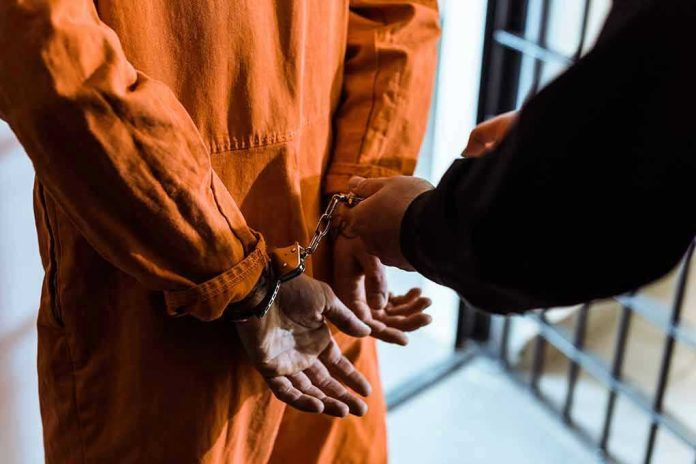
A Maryland teen’s brutal school murder and 80-year sentence expose how failed progressive juvenile justice policies put American children at risk—and why restoring law and order is more urgent than ever.
Story Snapshot
- Jaylen Prince, 16, murdered a classmate inside Joppatowne High School, Maryland, after years of unchecked violent behavior.
- Despite at least 18 prior violent incidents, the system failed to intervene, allowing tragedy to unfold on school grounds.
- Prince’s violence continued in juvenile detention, raising alarms about institutional breakdowns and lack of accountability.
- The 80-year sentence reignites a debate over juvenile sentencing, public safety, and the consequences of failed leftist policies.
Teen’s Violent History Ignored by Failing Institutions
Between October 2021 and May 2024, Jaylen Prince racked up at least 18 violent incidents in Maryland public schools without facing meaningful consequences. Administrators and juvenile justice officials documented his aggression, yet he remained in the classroom, free to escalate. This failure to act—rooted in lenient, so-called “rehabilitative” approaches pushed by the left—created an environment where law-abiding students and teachers became targets. The tragedy at Joppatowne High School in September 2024 was not an isolated event; it was the result of a system that prioritized ideology over safety.
'History of Violence': Maryland Teen Sentenced to 80 Years After Ruthlessly Murdering Classmate in School via @WestJournalism https://t.co/udTT9552hk
— @LibbyTard6 (@LibbyTard6) November 3, 2025
After the fatal shooting, Prince was transferred to the Charles H. Hickey Jr. School, a juvenile detention facility. Instead of improving, his violent behavior worsened—he was involved in at least 14 more violent incidents while in custody. These continued offenses highlight deep flaws in Maryland’s juvenile justice practices. Proponents of reform claimed that early intervention and rehabilitation would deter future crimes, but Prince’s ongoing aggression shows just how ineffective these programs have been when not backed by firm consequences and real accountability.
School Safety and Parental Trust Betrayed
The murder occurred inside a school bathroom, shattering the community’s sense of security. For parents who trust that sending their children to school is safe, this case is a sobering reminder of what happens when discipline is replaced by bureaucratic hand-wringing. The victim, Warren Grant, was a 15-year-old student with no known connection to Prince. His life was cut short not only by a peer’s brutality, but by institutional apathy that failed to separate dangerous individuals from the general student population. This tragedy exposes the consequences of policies that downplay or excuse violent behavior in the name of progressive values.
State’s Attorney Alison Healey prosecuted the case, emphasizing zero tolerance for school violence and the necessity of a strong sentence. The court’s decision to hand down an 80-year sentence—one of the longest ever for a juvenile in the state—signals a rejection of failed leniency and a renewed focus on deterrence and justice. This approach resonates with Americans who demand law and order and value the safety of their communities over empty rhetoric about rehabilitation for repeat offenders.
Juvenile Justice Debate: Public Safety or Progressive Experiment?
Prince’s defense claimed fear and self-defense, but evidence and testimony indicated premeditation and aggression. The court and prosecutors, recognizing the ongoing threat posed by Prince, acted decisively to protect the public. Yet, this case has reignited controversy over how juveniles are prosecuted and sentenced. Progressive voices argue that lengthy sentences ignore the potential for reform, but the grim reality is that unchecked repeat offenders endanger everyone. Conservative advocates argue that the core mission of the justice system must be to protect the innocent, not to experiment with dangerous rehabilitative theories that put families at risk.
Policy discussions in Maryland and beyond are now underway, with parents and community leaders demanding real reform—measures that prioritize school safety, restore discipline, and ensure that violent youths are swiftly removed from environments where they can inflict harm. The failure in this case is not just about one individual, but about a broken system that let him slip through the cracks again and again, with devastating consequences.
Calls for Accountability and Reform Under New Leadership
With President Trump’s administration restoring law and order nationwide, Americans are witnessing a renewed commitment to public safety and accountability. Federal support for real justice reform and the end of radical, ineffective policies has set a new tone. Parents, educators, and law enforcement can once again expect government to stand with them—not against them. The aftermath of the Joppatowne High School tragedy demands more than thoughts and prayers; it requires action to ensure that American schools are sanctuaries of learning, not battlegrounds for failed progressive experiments. True reform begins when we place the safety of our children above the demands of activist bureaucrats and return to common-sense, traditional values that built this nation’s greatness.
As Maryland and the nation reflect on this case, the lesson is clear: only by rejecting dangerous leniency and restoring accountability can we protect our communities and uphold the values that matter most to American families.
Sources:
Joppatowne High killer receives 80-year sentence
Jaylen Prince, Warren Grant: Joppatowne sentencing, Maryland high school
Teen sentenced to 80 years for classmate’s murder sparks juvenile justice debate




